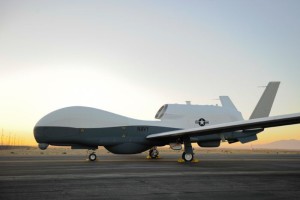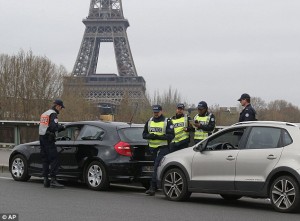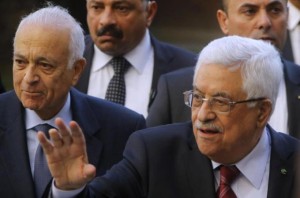News from Australia, France and Israel
Tuesday's World Events — Posted on March 18, 2014
AUSTRALIA – Government to spend £1.6bn on drone fleet to protect borders
Australia announced plans on Thursday for a fleet of giant hi-tech unmanned drones to help patrol the nation’s borders, monitoring energy infrastructure and attempts to enter the country illegally.

The MQ4C Triton unmanned aerial vehicle
Prime Minister Tony Abbott said the Triton Unmanned Aerial Vehicles, which can remain airborne for 33 hours, would be based in the southern city of Adelaide.
A report in February said seven of the US-made drones would be purchased for Aus$3 billion (U.S. $2.73 billion), but Abbott said the details of how many and when had yet to be finalized.
“These aircraft will patrol Australia’s vast ocean approaches, and work closely with other existing and future Australian Defence Force assets to secure our ocean resources, including energy resources off northern Australia, and help to protect our borders,” he said.
“They will provide the Australian Defence Force with unprecedented maritime surveillance capabilities, operating at altitudes up to 55,000 feet over extremely long ranges while remaining airborne for up to 33 hours.”
 Australia is expected to use the drones to patrol far over the Indian Ocean, which has become one of the world’s most vital energy supply routes.
Australia is expected to use the drones to patrol far over the Indian Ocean, which has become one of the world’s most vital energy supply routes.
They could also be used to detect illegal fishermen and asylum-seekers, who frequently enter Australian waters to the north on rickety boats, usually setting sail from Indonesia and Sri Lanka.
The announcement comes just weeks after Canberra said it would buy eight new Poseidon aircraft for Aus$4 billion (U.S. $3.63 billion) to form the core of its surveillance and maritime strike capacity for decades to come.
“Given that Australia has responsibility for something like 11 per cent of the world’s oceans, it’s very important that we’ve got a very effective maritime surveillance capability,” Abbott added.
The use of large unmanned aircraft patrolling the nation’s borders has been mulled for a decade but the previous Labor* government would not sign off on the concept as it reportedly believed the technology was not mature enough. [In Australia, the two main political parties are the Liberal Party which is considered center-right (more conservative) and the Labor Party which is considered center-left (more liberal).]
FRANCE – Paris orders drivers with even number plates off the road
Hundreds of police manned checkpoints around Paris from dawn on March 17, to stop any car whose license plate ended with an even number from entering the city.

Check point: Police officers check vehicles’ licence plate numbers along the Seine river in Paris
Drivers who defied the alternate-day ban faced on-the-spot fines of €22 ($30.64) or €35 ($49) if they paid within three days. …
By midday on Sunday, Paris police said they had handed out nearly 4,000 fines to drivers not respecting the restriction, aimed at reducing the “dangerously” high levels of harmful particles that have blighted the atmosphere for five straight days. There was half the usual number of traffic jams.
Yet droves of Parisians could still be seen driving around in their “banned” vehicles – either pleading total ignorance or hoping the police would turn a blind eye.
At a busy crossing…in Paris’ northeastern [section], police were stopping cars every minute to inquire as to why they were on the road with an even number plate.
 “I thought zero was an odd number,” pleaded Jules Taieb, 68, rather unconvincingly, who runs a prêt à porter clothes business. Like many Parisians, the motorist had left his own car in the garage and rented a vehicle he believed was allowed on the road. “We decided to let him off as we think his mistake was in good faith,” said a police officer.
“I thought zero was an odd number,” pleaded Jules Taieb, 68, rather unconvincingly, who runs a prêt à porter clothes business. Like many Parisians, the motorist had left his own car in the garage and rented a vehicle he believed was allowed on the road. “We decided to let him off as we think his mistake was in good faith,” said a police officer.
Commercial, electric and hybrid cars, as well as any vehicle carrying three people or more, are exempted from the ban – the first since 1997. …
Taxi drivers…confirmed that there were far less cars on the road.
“It’s very fluid,” said Sami Iazogen, 28. “But this measure has come too late. If they’d done it last week I would have understood, but today you can feel the air is already clearing up – it’s cooler and windier and by tomorrow it will have all blown over.”
His prediction proved entirely accurate as by mid-afternoon, the government announced a lifting of the partial ban due to a “clear tendency towards an improvement” in air quality.
ISRAEL – Arab League rejects Israel’s demand for recognition as a Jewish state
Palestinian Authority President Mahmoud Abbas gained Arab League support on Sunday, March 9 for his refusal to recognize Israel as the nation state of the Jewish people, a week before his planned meeting with President Obama (which took place March 17).
 [The League of Arab States, or Arab League, is a voluntary association of countries whose peoples are mainly Arabic speaking or where Arabic is an official language. It consists of independent Arab States on the territory of northern and north-eastern part of Africa and southwest Asia. Members do not recognize Israel, but instead label it “Palestine” on the map.]
[The League of Arab States, or Arab League, is a voluntary association of countries whose peoples are mainly Arabic speaking or where Arabic is an official language. It consists of independent Arab States on the territory of northern and north-eastern part of Africa and southwest Asia. Members do not recognize Israel, but instead label it “Palestine” on the map.]
“The council of the Arab League confirms its support for the Palestinian leadership in its effort to end the Israeli occupation over Palestinian lands and emphasizes its rejection of recognizing Israel as a ‘Jewish state,’” Arab foreign ministers said in a statement in Cairo.
Arab League chief Nabil Elaraby said Israeli Prime Minister Benjamin Netanyahu’s demand goes beyond the framework of the negotiations and that there was no need to accept this Israeli position.

Arab League chief Nabil Elaraby and Palestinian Authority President Mahmoud Abbas
These statements came fast on the heels of unequivocal comments by Abbas in recent days against compromising on this issue, one of Prime Minister Netanyahu’s key demands.
President Abbas, in a speech to students Thursday broadcast on Palestinian TV and translated by the Middle East Media Research Institute (MEMRI), said: “We shall never agree to recognize the Jewish state.”
Abbas said that the “five million Palestinian refugees and their offspring” will have the option of “returning” to Israel and “holding Israeli citizenship.”
Abbas also said that any agreement will have to be approved by all Palestinians worldwide, “from Canada to Japan.” If they say no, he said, “the proposal will not pass.”
One Israeli government official, responding to the Arab League statement and to Abbas’s recent comments, said “there will be no peace, there can be no peace, as long as the Palestinian leadership sticks to these fantasies, as long as it remains stuck in its hard-line maximalist positions.”
If the international community wants to see peace, the official said, it needs to take the Palestinians to task for its maximalist positions.
“The international community [babies] the Palestinians and does not hold them responsible for what they say and do. If the [members of the] international community want to see peace, they have to realize it is a two-way street, and they need to call out the Palestinian leaders when they make hard-line statements. If not, if there is no negative feedback, then what motivation do they have to change their hardline positions.”
(The news briefs above are from wire reports and staff reports posted at London’s Daily Telegraph on March 13 and March 17 and The Jerusalem Post on March 9.)
Questions
1. For each of the 3 countries, provide the following information:
a) capital:
b) location/the countries that share its borders:
c) the religious breakdown of the population:
d) the type of government:
e) the chief of state (and head of government if different) [If monarch or dictator, since what date has he/she ruled? - include name of heir apparent for monarch]:
f) the population:
[Find the answers at the CIA World FactBook website. For each country, answers can be found under the "Geography" "People" and "Government" headings. Go to worldatlas.com for maps and a list of continents.]
NOTE: Before answering the questions below, read the info under “Background” and “Resources.”
2. For AUSTRALIA:
a) list the who, what, where and when of the news item
b) Why is maritime surveillance so important to Australia? Be specific.
c) Do you think this type of surveillance is a good idea for Australia? How about for the U.S.? Is the government's use of drones patrolling our land and ocean the best way to protect us? Explain your answer. Ask a parent the same question.
3. For FRANCE:
a) list the who, what, where and when of the news item
b) What was the purpose of banning drivers with even-numbered license plates from entering Paris on March 17?
c) How did taxi driver Sami Iazogen view the ban? What do you think of his assertion?
4. For ISRAEL:
a) list the who, what, where and when of the news item
b) Why must Israel insist that the Palestinian state (and the Arab League) acknowledge Israel as the nation state of the Jewish people as a condition for any peace agreement?
Background
FRANCE: Parisian reaction to the car ban:
Jonathan Hattab, 32, a salesman from Charenton, outside Paris was pulled over but only given a warning... “The cops were nice. I’m not supposed to be on the road, but they totally let me off,” he said. “I work with my car, but don’t have any proof of that, bar a business card. Personally I think this is stupid. This is a political stunt two weeks from municipal elections. It’s not about saving the planet.”
Cherif Bacha, 46, an electrician at Orly airport, entered Paris on his scooter for a dental appointment with an even number plate. “I work nights and didn’t see the news yesterday and had no idea about this rule,” he said. But he supported the move and already wore a mesh over his nose and mouth to fight pollution.
Pedestrian Cyrielle Nicolas, 27, a make up artist and hairdresser, said she had suffered swollen eyes for the past few days. But she questioned the timing. “The problem of pollution in Paris is nothing new - we get spikes every year so why the car ban now? We need longer term measures otherwise nothing will change. I think we should follow London and make cars pay to enter the city center.”
ISRAEL
In the speech, Abbas also rejected the notion of settlement blocs.
“Our position is that the settlements – from start to finish – are illegal,” he said. “They talk about settlement blocs, or about settlements here and there, but we say that every house and every stone that were placed in the West Bank since 1967 and to this day are illegal, and we do not recognize them.”
Channel 2, meanwhile, reported that Netanyahu directed his cabinet secretary Avichai Mandelblit to study the complicated model of enclaves and exclaves along a section of the Belgium-Netherlands border, as a possible model for allowing settlements to remain in place in the West Bank following an agreement.
Netanyahu said in interviews over the weekend that he would not evacuate settlements, though some of them would not remain within Israel’s permanent boundaries.
In a related development, chief Palestinian negotiator Saeb Erekat said that Abbas told him he won’t quit talks until the fourth Palestinian prisoner release at the end of the month.
Erekat said he urged Abbas to abandon the negotiations.
Israel is scheduled to release a final batch of 26 Palestinian security prisoners on March 28, the last of 104 convicted terrorists Israel took upon itself last July to set free as a way to begin negotiations with the Palestinians.
The nine-month talks are set to expire at the end of April. Diplomatic sources are expecting a frenzy of US diplomatic efforts over the next two weeks, in the hope that US Secretary of State John Kerry can present his framework paper before the prisoner release, to ensure that the release takes place and that the talks continue past their late April deadline.
Erekat said the gaps between the two sides were “still very wide.”
Deputy Foreign Minister Ze’ev Elkin, who is opposed to the prisoner release on principle, responded to Erekat’s comments by saying there was no point in releasing the prisoners if the Palestinians were not willing to continue the talks.
“I think we should demand that the Palestinians give a clear answer before the release whether negotiations are continuing or not,” he said.
THE ARAB LEAGUE:
The Arab League has 22 member states.
The Arab League was founded in Cairo in 1945 by Egypt, Iraq, Lebanon, Saudi Arabia, Syria, Transjordan (Jordan from 1946) and Yemen (North Yemen, later combined Yemen). There was a continual increase in membership during the second half of the 20th century, with additional 15 Arab states and 4 observers being admitted.
From the website, the" goal of the Arab League is to look after their members’ economic, political, cultural, national and religious interests. The Arab League has been active in helping the Arab world grow economically and culturally, while finding solutions to resolve conficts both within the leage and outside of it."
